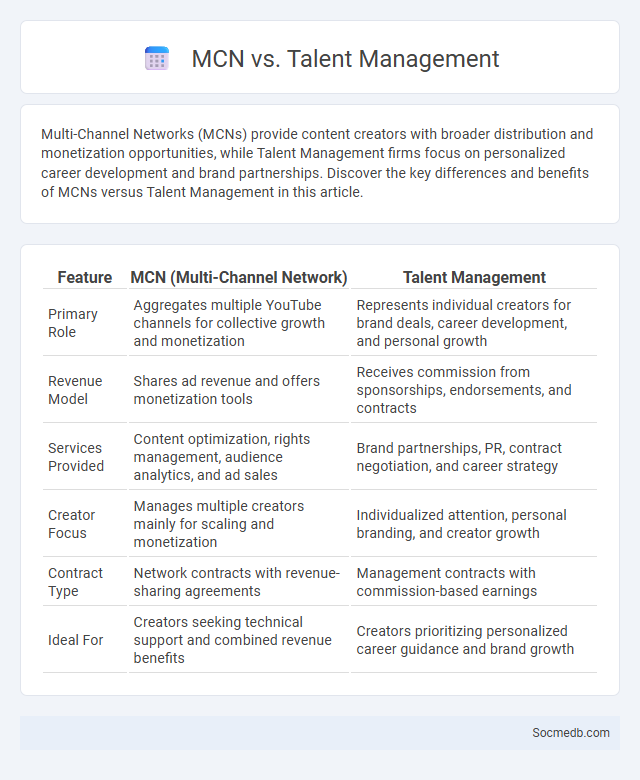
Photo illustration: MCN vs Talent Management
Multi-Channel Networks (MCNs) provide content creators with broader distribution and monetization opportunities, while Talent Management firms focus on personalized career development and brand partnerships. Discover the key differences and benefits of MCNs versus Talent Management in this article.
Table of Comparison
| Feature | MCN (Multi-Channel Network) | Talent Management |
|---|---|---|
| Primary Role | Aggregates multiple YouTube channels for collective growth and monetization | Represents individual creators for brand deals, career development, and personal growth |
| Revenue Model | Shares ad revenue and offers monetization tools | Receives commission from sponsorships, endorsements, and contracts |
| Services Provided | Content optimization, rights management, audience analytics, and ad sales | Brand partnerships, PR, contract negotiation, and career strategy |
| Creator Focus | Manages multiple creators mainly for scaling and monetization | Individualized attention, personal branding, and creator growth |
| Contract Type | Network contracts with revenue-sharing agreements | Management contracts with commission-based earnings |
| Ideal For | Creators seeking technical support and combined revenue benefits | Creators prioritizing personalized career guidance and brand growth |
Understanding MCN: Definition and Role
Understanding MCN (Multi-Channel Network) is essential for leveraging social media growth, as MCNs partner with content creators to provide services like audience development, brand deals, and monetization strategies. MCNs aggregate numerous YouTube channels or social media profiles to enhance reach and optimize content distribution, boosting your visibility and revenue potential. Your collaboration with an MCN can streamline managing digital rights, analytics, and advertising, facilitating a more efficient path to expanding your online brand.
What is Talent Management in the Digital Era?
Talent management in the digital era involves leveraging advanced social media platforms and AI-driven tools to identify, attract, and retain skilled professionals. Your organization can enhance employee engagement and streamline recruitment by utilizing data analytics and real-time feedback from social networks. Emphasizing continuous learning and digital collaboration tools ensures a competitive edge in acquiring and developing top talent.
MCN vs Talent Management: Key Differences
MCNs (Multi-Channel Networks) primarily focus on providing creators with revenue optimization, cross-channel promotion, and content support, while Talent Management agencies emphasize personalized career growth, brand partnerships, and long-term strategic guidance. Your choice depends on whether you seek comprehensive content monetization and network benefits (MCN) or tailored management to build your personal brand and secure diverse opportunities. Understanding these key differences helps you maximize your social media influence effectively.
How MCNs Support Content Creators
MCNs (Multi-Channel Networks) provide invaluable support to content creators by offering access to advanced analytics, monetization opportunities, and brand partnership deals. These networks assist creators in optimizing content strategies through data-driven insights and facilitate revenue growth via ad sales and sponsorship connections. MCNs also handle copyright management and audience development, allowing creators to focus on producing quality content.
Talent Management Agencies: Functions and Services
Talent Management Agencies specialize in discovering, nurturing, and promoting artists, influencers, and professionals across various entertainment and media sectors. Their services include contract negotiation, career development, brand building, and securing endorsements or collaborations on social media platforms like Instagram, TikTok, and YouTube. By leveraging digital marketing strategies and analytics, these agencies enhance their clients' visibility and engagement, driving growth in audience reach and revenue.
Pros and Cons of MCNs for Influencers
Multi-Channel Networks (MCNs) offer influencers access to resources like brand deals, production support, and audience growth strategies, which can significantly enhance monetization and visibility. However, MCNs often require revenue sharing and impose contractual restrictions that may limit creative freedom and financial independence. Influencers must weigh the benefits of network support against potential loss of control and earnings when choosing to partner with an MCN.
Advantages and Disadvantages of Talent Management
Talent management on social media platforms enables organizations to reach a vast pool of diverse candidates quickly, enhancing recruitment efficiency and employer branding. However, relying heavily on social media can lead to challenges such as potential biases in candidate evaluation and the risk of privacy breaches. Your strategic use of social media for talent management can drive innovation but requires careful balancing of these advantages and disadvantages.
Choosing Between MCN and Talent Management
Choosing between Multi-Channel Networks (MCNs) and talent management firms requires evaluating control, revenue share, and support offered. MCNs provide structured partnership programs, advanced analytics, and cross-promotion opportunities, while talent management focuses on personalized career growth, brand development, and long-term deal negotiations. Content creators should assess their growth goals, desired autonomy, and financial expectations to determine the optimal support system in the social media landscape.
Trends Shaping MCN and Talent Management in 2024
Emerging trends in 2024 are revolutionizing MCN and talent management by emphasizing AI-driven content personalization and data analytics to boost audience engagement. You can expect deeper integration of augmented reality experiences and cross-platform strategies that enhance influencer reach and brand collaboration. The growing importance of community-building and authentic storytelling is reshaping how talent agencies curate and expand digital creators' unique value propositions.
Which Model Best Fits Your Creator Journey?
Choosing the right social media model depends on your creator journey, focusing on platforms that align with content style, audience engagement, and monetization strategies. Visual-centric models like Instagram and TikTok fit creators prioritizing short-form video and image-based content, maximizing reach through trends and hashtags. Meanwhile, YouTube's long-form video model supports creators aiming for in-depth storytelling, tutorials, or education, offering robust monetization through ads and memberships.
 socmedb.com
socmedb.com